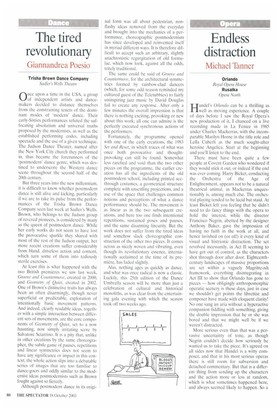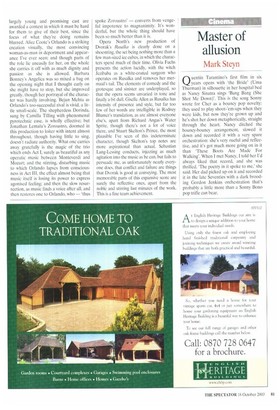Endless distraction
Michael Tanner
Orlando Royal Opera House Rusalka Opera North
Handel's Orlando can be a thrilling as well as moving experience. A couple of days before I saw the Royal Opera's new production of it, I chanced on a live recording made in La Fenice in 1985 under Charles Mackerras, with the incomparable Marilyn Home in the title role and Lella Cuberli as the much sought-after heroine Angelica. Start at the beginning and you'll listen to the end.
There must have been quite a few people at Covent Garden who wondered if they would stick it out, or indeed if the end was ever coming. Harry Bicket, conducting the Orchestra of the Age of Enlightenment, appears not to be a natural theatrical animal, as Mackerras unquestionably is, among much else. The orchestral playing tended to be lucid but staid. At least Bicket left you feeling that he didn't need to do fancy things with the opera to hold the interest, while the director Francisco Negrin, abetted by the designer Anthony Baker, gave the impression of having no faith in the work at all, and hence lavished on (or off) it every kind of visual and histrionic distraction. The set revolved incessantly, in Act II seeming to have got out of control, as the characters shot through door after door. Eighteenthcentury landscapes of massive proportions are set within a vaguely Magritte-ish framework, everything disintegrating in Act III to show that Orlando has gone to pieces — how obligingly anthropomorphic operatic scenery is these days, just in case we shouldn't get points the librettist and composer have made with eloquent clarity! No one sang an aria without a hyperactive companion fiddling with something, giving the double impression that he or she was bored and that we might well be if we weren't distracted.
More serious even than that was a pervasive uncertainty of tone, as though Negrin couldn't decide how seriously he wanted us to take the piece. It's agreed on all sides now that Handel is a witty composer, and that in his most serious operas there is still room for subversion and detached commentary. But that is a different thing from sending up the characters and the action more or less at random, which is what sometimes happened here, and always seemed likely to happen. So a largely young and promising cast are awarded a context in which it must be hard for them to give of their best, since the focus of what they're doing remains blurred. Alice Coote's Orlando is a striking creation visually, the most convincing woman-as-man in deportment and appearance I've ever seen; and though parts of the role lie uneasily for her, on the whole she carries it off with as much dignity and passion as she is allowed. Barbara Bonney's Angelica was so mixed a bag on the opening night that I thought early on she might have to stop, but she improved greatly, though her portrayal of the character was hardly involving. Bejun Mehta as Orlando's too-successful rival is vivid, a little small-scale. The shepherdess Dorinda, sung by Camilla Tilling with phenomenal pyrotechnic ease, is wholly effective; but Jonathan Lemalu's Zoroastro, doomed in this production to loiter with intent almost throughout. though having little to sing, doesn't radiate authority. What one carries away gratefully is the magic of the trio which ends Act I, surely as beautiful as any operatic music between Monteverdi and Mozart; and the stirring, disturbing music to which Orlando lapses from consciousness in Act III, the effect almost being that music itself is losing its power to express agonised feeling; and then the slow resurrection, as music finds a voice after all, and then restores one to Orlando, who — 'thus spoke Zoroastro' — converts from vengeful impotence to magnanimity. It's wonderful, but the whole thing should have been so much better than it is.
Opera North's new production of Dvorak's Rusalka is clearly done on a shoestring, the set being nothing more than a few man-sized ice cubes, in which the characters spend much of their time. Olivia Fuchs presents the action lucidly, with the witch Jezibaba as a white-coated surgeon who operates on Rusalka and removes her mermaid's tail. The elements of comedy and the grotesque and sinister are underplayed. so that the opera seems unvaried in tone and finally a bit dull. Giselle Allen as Rusalka has intensity of presence and style, but far too few of her words are intelligible in Rodney Blumer's translation, as are almost everyone else's, apart from Richard Angas's Water Sprite, though there's not a lot of voice there, and Stuart Skelton's Prince, the most plausible I've seen of this indeterminate character, though Skelton's top notes are more aspirational than actual. Sebastian Lang-Lessing conducts, injecting as much agitation into the music as he can, but fails to persuade me, as unfortunately nearly everyone does, that conflict and failure are things that Dvorak is good at conveying. The most memorable parts of this expansive score are surely the reflective ones, apart from the noble and stirring last minutes of the work. This is a fine team achievement.



































































































 Previous page
Previous page